Film Inquiry’s Top Films Of The Academy
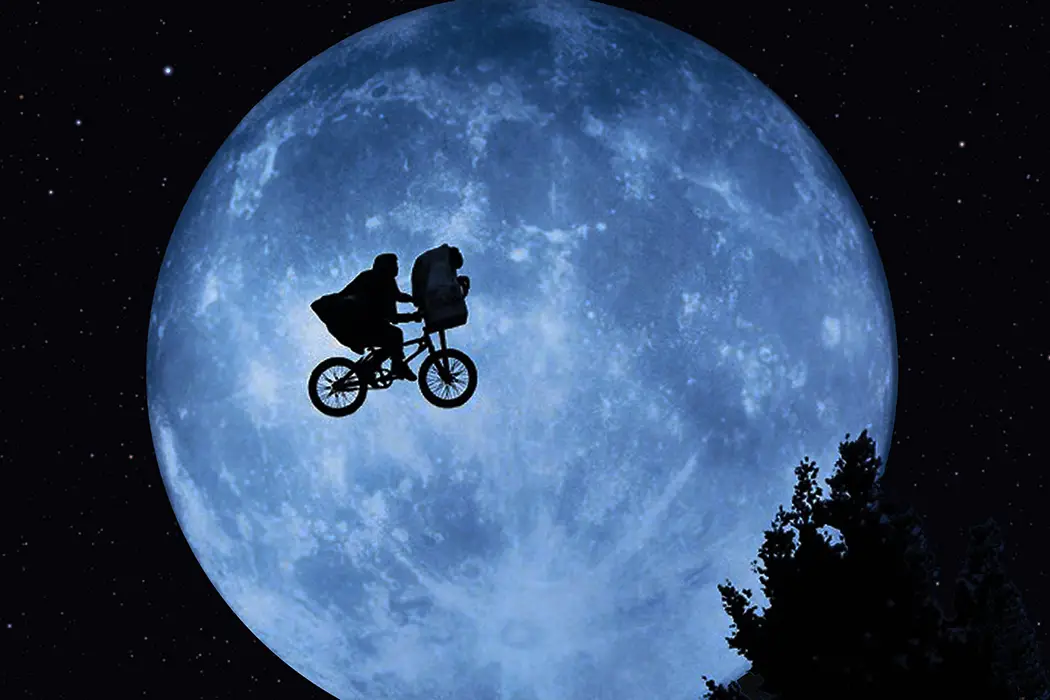
Stephanie Archer is 39 year old film fanatic living in…
Everyone has their favorite film, a cherished classic that reigns superior to all the others. With the 89th Academy Awards on the horizon, the writers at Film Inquiry have come together to acknowledge our all-time favorites that have been recognized during the history of the Academy. So many films have received the praise and recognition – even with just a nomination.
The writers of Film Inquiry have chosen their “Films of the Academy” – each selecting their top ten films that have received a nomination in the following five categories: Best Picture, Best Animated Feature, Best Foreign Language Film, Best Short, or Best Documentary. By opening our selection base beyond just Best Picture, our writers were able to share with our readers a vast array of our most cherished films – possibly introducing you to one of our favorites you may have never considered before.
Stephanie Archer, Gone With the Wind
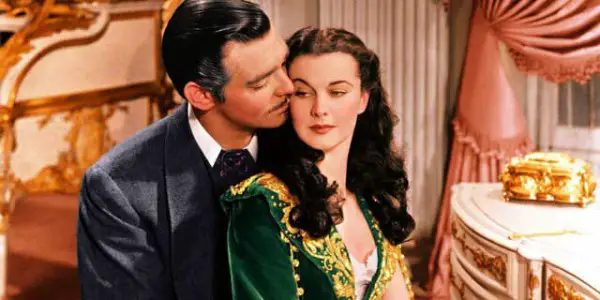
When tasked with choosing my favorite film nominated by the Academy, my initial list was overwhelming and seemingly impossible to narrow down to just a single film. As one by one I removed a film from my list, I continued to brainstorm what makes a film my number one. It has to be great, obviously, an all-around accomplishment in cinematic achievement, with awesome source material, perfect execution, strong cast, and an amazing script – I mean we are talking about #1 here. Then I realized what separates my “one” from all other contenders – what movie do I love watching the most? And with that one question, my entire list melted away, leaving only one choice – Gone With the Wind.
Gone With the Wind, directed by Victor Fleming, is a film I could watch and rewatch at any time; its epic depiction of the fall of the ole South and the aftermath that followed is a classic example of the power of film and what a great film should look like. From dramatic wide shots of the burning of Atlanta, GA, and the mass casualties of war laid out in lines awaiting treatment or death, to the in-depth character development that created a captivating story, this film hits every area of filmmaking – and hits a bullseye every time.
Vivian Leigh and Clark Gable lead a vast culmination of stellar performances that are paired with an unforgettable score and visual effects that pushed the boundaries of its time. Gone With the Wind is a classic that not only stood up to its competition, winning 8 Academy Awards in 1940, but has stood up to the test of time.
(The rest of Stephanie’s Top Ten: The English Patient, Beauty and the Beast, It’s A Wonderful Life, Gladiator, Schindler’s List, Titanic, The Godfather and Sense and Sensibility)
Alex Lines, Amadeus

Amadeus has all the ingredients to be the most typical, boring “Oscar Bait” film ever. It’s a period piece about an embellished rivalry between two 18th century composers that spans over 3 hours long, all elements that come with implications of a pretentious and tedious nature, but Miloš Forman avoids all of that.
Much like La La Land at the moment, Amadeus was a juggernaut when it came to awards season, gaining 11 nominations (same as La La Land) and winning 8 of them, including Best Picture, Actor, Director, and Screenplay, crushing the competition in the most highly revered sections. This highlights what makes Amadeus work so well. It’s an incredibly successful mix of its technical and creative elements, as the film nails its period setting, whilst making it accessible for mainstream audiences without dumbing down its material or making it completely straight-faced.
Much like the works of cult director Alex Cox, Forman infuses his black comedy background into the dead-serious world of 18th century upper class society, celebrating their decadent culture whilst also laughing at the completely ridiculous nature of it all. Like Cox, Forman subverts expectations when it comes to biopics, crafting a fictional story using real-life characters, an unusual type of storytelling that isn’t explored enough in cinema.
The background of monumental orchestral music boosts the epic feeling of the whole film, with the frequent religious imagery and themes of jealousy and revenge giving it a biblical nature that heightens the central antagonistic relationship between the two central characters – Antonio Salieri and Wolfgang Amadeus Mozart, both played brilliantly by F. Murray Abraham and Tom Hulce. Even if you don’t enjoy Amadeus, you cannot deny that it is incredibly impressive to look at, an intelligent big budget blockbuster that Hollywood sadly avoids nowadays – a grand period epic that has been replaced with the independent drama.
(The rest of Alex’s Top Ten: 12 Angry Men, Z, Taxi Driver, Goodfellas, Pulp Fiction, Fargo, L.A.Confidential, Mad Max: Fury Road, and The Secret in Their Eyes)
Daniel Palmer, The Conversation

Coppola’s crystalline character study treads the line between the paranoia thrillers then in vogue and a treatise on guilt informed by its writer/director’s Catholic upbringing. The Conversation is the dark horse of Coppola’s legendary ’70s streak, struggling to escape the lengthy shadows cast by The Godfather, The Godfather: Part II and Apocalypse Now – it was one of two Best Picture nominations Coppola received in 1974.
But far from being the work of a single visionary, The Conversation is a work in which every facet functions at its fullest capacity: there is groundbreaking sound design from Walter Murch; an ominous score from David Shire; and elegantly muted cinematography from Bill Butler (with the great Haskell Wexler working uncredited).
The Conversation features a raft of venerable character actors from American Zoetrope’s repertory – the likes of Robert Duvall, John Cazale, Frederic Forrest and Harrison Ford. But it is marshaled by a sensational central performance from Gene Hackman as ‘the best bugger on the west coast’, Harry Caul. In contrast to his bombastic turn in The French Connection, Hackman brings a tempered, tortured quality to Caul as he grapples with the ramifications of his work. It is a study in stillness, subtlety, and inner-tumult.
Though it addressed post-Watergate malaise and suspicion, The Conversation is not without contemporary resonance in its exploration of surveillance. There is a 2014 article from The Atlantic which argues that it should be required viewing for the NSA. One can only wonder at the moral dilemmas such viewings would elicit. Forty years on, The Conversation remains as socially relevant and disquieting as ever.
(The rest of Daniel’s Top Ten: Dogtooth, Double Indemnity, Taxi Driver, A Clockwork Orange, Apocalypse Now, Bicycle Thieves, There Will Be Blood, Citizen Kane, and Network)
Dave Fontana, Taxi Driver
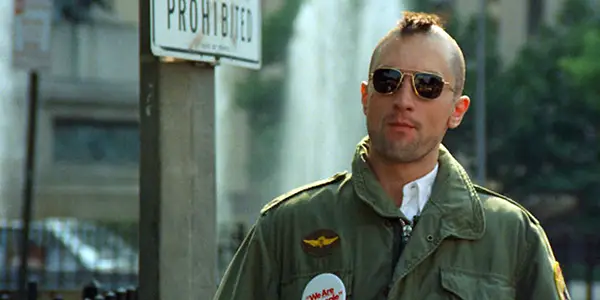
Taxi Driver is that rare film that ages like a fine wine. Martin Scorsese’s greatest masterpiece (yes, even more so than Raging Bull and Goodfellas), the film was nominated for Best Picture, Best Actor for Robert De Niro, Best Supporting Actress for Jodie Foster, and Best Original Score. Though ultimately winning none of these awards, it is a film very much worth revisiting.
Robert De Niro stars as Travis Bickle, a taxi driver in New York City who, through the course of his nightly rides, has a window into the dredges of the city. He witnesses brutal beatings, a person discussing impending murder with the casualness of small talk, and what he perceives to be the absolute worst of humanity, a prostitution ring that employs a 14-year-old girl (played by Jodie Foster in one of her first roles). Eventually disgusted beyond reproach, Bickle starts to gain a false sense of heroism, taking it upon himself to “fix” the bruised society around him.
What really endures about Taxi Driver, other than De Niro’s and Foster’s brilliant performances, or the sizzlingly drab Jazz score by Bernard Herrmann, is its delving into the mindset of a troubled loner, and in turn, reflecting on the sickening world of NYC for the time. Its famously ambiguous ending, in which Bickle is viewed as a hero for his mass killing spree, has been interpreted by some as a fantasy; yet I never saw it as much more than the very real outcome that could result after years of aggravating crime. The vigilante who takes it upon himself to rid his city of horrific people is celebrated as a hero rather than the criminal status that he more likely deserves (much like Charles Bronson‘s character in Death Wish, which came out only two years prior).
Taxi Driver is a shadowy and dismal character study by Martin Scorsese; over 40 years later, our current politically tense environment reflects back on the blood-spattered streets of Travis Bickle’s New York. It is a film that is more relevant than ever.
(The rest of Dave’s Top Ten: Pan’s Labyrinth, It’s a Wonderful Life, The Lord of the Rings: The Fellowship of the Ring, Double Indemnity, High Noon, The Godfather, Butch Cassidy and the Sundance Kid, The Graduate, and Dr. Strangelove)
Amanda Mazzillo, Broadcast News
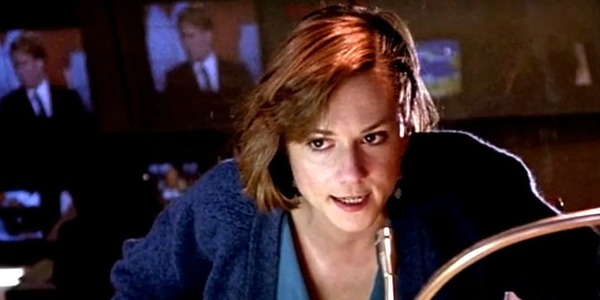
The 1987 James L. Brooks romantic comedy, Broadcast News, is one of my favorite films. Broadcast News has become my go-to film whenever I’m feeling down. The film is a wonderful look at the news industry, ethics, and personal worth.
Holly Hunter’s performance as Jane Craig brings emotion and conviction to the foreground. The film never focuses solely on romance. It is always about the journey these characters take and how their own views on ethics and the softening of news affect their relationships. Albert Brooks stars as Aaron Altman, the longtime friend and co-worker of Jane. His performance steals the show, especially in scenes focusing on the character’s own self-doubts, surrounding his career and his relationship with Jane. William Hurt’s performance as Tom Grunick acts as a catalyst to everything in the film. His character brings out the ideals and doubts of Jane and Aaron, while also showing his own faults and shortcomings.
Typically, romantic comedy films are so focused on crafting a romance, they don’t take the time to develop each character, but Broadcast News does this exceptionally well. Jane, Tom, and Aaron are all developed to the point that the audience cares about each character individually, instead of only in relation to their romantic involvements.
The questions of ethics in news help bring the film to another level. Instead of focusing entirely on romance, the film shows how the relationships of the characters are impacted by their personal views on ethics in news, qualifications for jobs, and the softening of news. No character is without flaws, which helps create a better, and more realistic exploration of both romance and the changing news industry.
(The rest of Amanda’s Top Ten: The Graduate, Wreck-It Ralph, It Happened One Night, The Silence of the Lambs, American Beauty, An Education, Nebraska, Bonnie and Clyde and Dr. Strangelove)
Noah Walsh, Mad Max: Fury Road
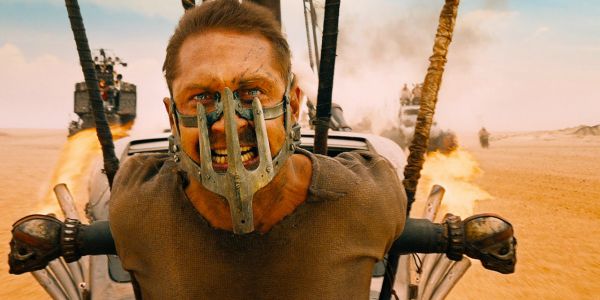
The first time I saw Mad Max: Fury Road, I was overcome with chills when Max (Tom Hardy) finally opens up and tells Furiosa (Charlize Theron) his real name. It’s such genius storytelling that after such a brutal, pulsing climax, something so simple can resonate as catharsis. The film’s incredible visual beauty and its engrossing lead characters are often overlooked for its action, but George Miller paints a masterpiece with every shot. The colors, even the white makeup covering the war boys from head to toe, pop off the screen. Some of the camera movements are inventive and bizarre, like being in the front seat of a roller coaster.
Hardy’s little tics and Theron’s jaw-clenched emotion add depth through subtlety that is lost on many more “Oscar-y” films. While much has been said about the film’s misleading title, it’s worth mentioning again that Max is matched by and eventually in awe of a powerful, hopeful female protagonist. Theron was due a nomination for her performance, and I believe arguments could be made for Hardy, as well. This is far from neat and tidy, and it isn’t meant to be. But it only gets stronger with repeat viewings, where the small details start to add up and create a larger world. The more times you treat yourself to Mad Max: Fury Road, too, the more emotionally powerful it becomes. Its nomination was a breath of fresh air, a truly weird action film amidst the usual period pieces and stodgy biopics.
(The rest of Noah’s Top Ten: The Lord of the Rings: The Return of the King, Brokeback Mountain, One Flew Over the Cuckoo’s Nest, Inglorious Bastards, The Sixth Sense, Star Wars: A New Hope IV, The Godfather, Taxi Driver and The Tree of Life)
Linsey Satterthwaite, E.T. the Extra-Terrestrial

When picking my favorite film of the nominees, I was deliberating between head and heart; and in the end, my heart won. E.T. the Extra-Terrestrial represents so much to me, not only about my childhood but the pure magic of cinema. It is a film that shaped and represents my love of film. So much of a film lover’s life is built upon nostalgia, how a film made them feel and the power to be transported back to that time is intoxicating. E.T. is the film for me that does that. It is crammed with cherished moments, from being captivated by the first time you see Elliot’s bike-ride across the moon, to the utter heartbreak you feel as E.T. begins to die in front of your eyes.
E.T. is also a showcase for a director at the height of his powers, with Spielberg wringing every ounce of cinematic emotion at his fingertips, all played out to an unforgettable John Williams score. It is a film that continues to inspire and captivate (yes Stranger Things I am talking about you), and also proves you are never too old to be enchanted by its spell.
My dad, who managed to avoid watching this film throughout our entire childhood and deemed it ‘not his sort of thing’, recently watched it and by the end he, a fifty something grown man who loves action movies, was just as misty-eyed as me. And yes I cry every time I watch it. I cry for E.T., I cry for Elliot, but I also have a moment to mourn my childhood as, whilst the film completes its running time, I am allowed to inhibit a space of the warmth of innocence, and lose myself completely to the childlike wonder of cinema.
(The rest of Linsey’s Top Ten: Double Indemnity, The Grand Budapest Hotel, Sunset Boulevard, The Lives of Others, A Clockwork Orange, L. A Confidential, The Red Shoes, Little Miss Sunshine, and There Will Be Blood)
Larry Oliver, The Salesman
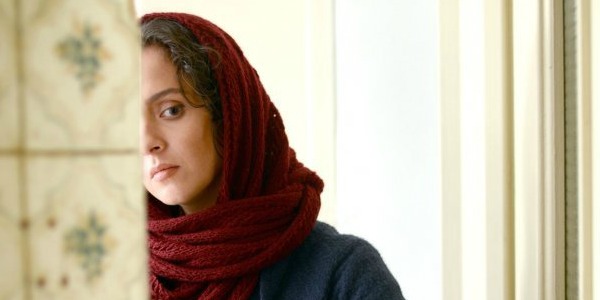
Formally more ambitious than his 2011 Oscar-winning drama, A Separation, The Salesman is a dramatically taut and powerful domestic drama from Iranian writer-director Asghar Farhadi. In it, an actor-teacher-husband, Emad (Shahab Hosseini) investigates an assault on his wife Rana (Taraneh Alidoosti) after she is home alone in the new apartment formerly occupied by a woman with loose morals. Not only is the apartment marked by drawings from the unknown woman’s child, but it is tinged with the whiff of scandal. Emad’s search drives him towards his own worst excesses. At what cost will he extract revenge?
The drama takes place during the run of a female-directed, Farsi language production of Arthur Miller’s Death of a Salesman, in which Emad plays Willy Loman, the alienated and exhausted salesman of the title, with Rana his long-suffering wife, Linda. You might expect Farhadi to indulge in some obvious parallels. His interest, though, is in the character of The Woman, Willy’s mistress. The actress playing her takes offence when she is mocked for her role; the egos involved in the production are fragile.
It is the ghost of the ‘loose woman’ that destabilizes Emad’s marriage. His search is as harrowing and morally ambiguous as Ethan Edwards’ quest for his niece in The Searchers. The finale is as tense a dramatic set-piece as you have ever seen. Farhadi’s skill as a director is in what he doesn’t show – compare the assault here to that on Isabelle Huppert’s character in Elle. You don’t see a thing. Because of this, we are put instantly and simply in Emad’s head, and share to some extent his desire for justice.
The film isn’t just a thrilling drama but an exploration of cultural appropriation – what Iran really takes from America. It examines too the tension between young and old, fragile family ties, and the purpose of metaphor – it has moments of humor. Sample (discussing a film): ‘How does a man turn into a cow?’ ‘Slowly!’
(The Rest of Larry’s Top Ten: Amélie, Amores Perros, Amour, Au Revoir Les Enfants,
Jo Bradley, The Grand Budapest Hotel
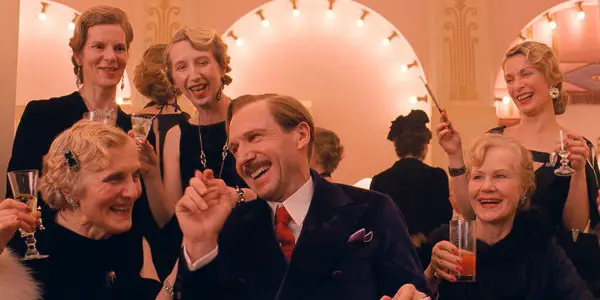
Wes Anderson, master of the quirky, has reached a career best (so-far) in the eccentric and charming The Grand Budapest Hotel. Nominated for Best Picture in 2014, it sadly lost out to the long, depressing, and inferior 12 Years a Slave. However, who needs an Oscar when you have Film Inquiry’s approval? Besides, had Anderson won, I’m confident he could not top his fantastic Golden Globes acceptance speech, so maybe it’s for the best.
The Grand Budapest Hotel chronicles the escapades of Gustave H. (Ralph Fiennes), a legendary concierge at a decadent but aging European hotel between the wars. The story is told in retrospect by Zero Moustafa (Tony Revolori), who was Gustave’s lobby boy and close friend in the 1930’s, when most of the film takes place. Gustave H. is well-mannered, ingratiating, and coquettish, with a habit of seducing the old, wealthy female hotel guests.
When a dowager (Tilda Swinton) suspiciously dies and bestows Gustave a priceless Renaissance painting, he is unjustly framed for her murder and tasked with discovering the true killer, while fleeing from various authorities with his lobby boy, Zero. It’s part buddy film, part crime investigation, and 100% Wes Andersonesque.
Anderson’s witty writing prioritizes character, and this eccentric narrative is perfect breeding ground for a host of oddballs, played by a superb ensemble cast. Like most Anderson films, there is a bucketful of fantastic actors, which are all featured on the poster. Regulars of the Anderson canon are present, including Bill Murray, Adrien Brody, Jeff Goldblum, Edward Norton and Jason Schwartzman. There’s also some fabulous performances by Tony Revolori as Zero, and Saoirse Ronan as his fiancé, the fiery pastry chef Agnus.
Ralph Fiennes is in top form here as the charming, classy, and flirtatious concierge, Gustave H. He was robbed by Michael Keaton at the Golden Globes, and the Academy’s preference for ‘serious’ performances means that he was tragically excluded from the Best Actor nominations.
Like all of Anderson’s films, every image is highly stylized, with centered cinematography and a bright pastel color scheme. Winning Oscars for Hair and Makeup, Production Design, Score, and Costume Design, the film is a visual delight. The characters, script, performances, and overall aesthetic makes this lively film a winner in my eyes, even if the Academy voters disagreed.
Akemi Aiello, Moana

With Moana, Disney finally gave me a movie that made me proud to see my culture on screen instead of picking out inaccuracies! Sure, Lilo and Stitch wasn’t necessarily misleading, but there wasn’t much of Hawaii present in the film even though it was set there. Moana was based on the real history of the voyages that founded Oceania and the culture it created. It gives the rest of the world a taste of this world, that on the inside feels vast, but to outsiders it’s so small that it’s overlooked.
Moana is the best animation that I’ve seen come out of Disney. The scene where Moana meets the ocean is one of the most beautiful scenes in all of 2016. The waves push out to surround her as the sea turtles swim by, against the wave’s wall as if she’s in a natural aquarium. It’s Disney’s imagination at its best; it was so simple but it shows the awe and wonder of the ocean that inspires Moana and the rest of the film. It is unbelievable how real some aspects of the film look – the glisten on the ocean is just right, and how delicately Moana’s hair blows in the breeze.
Moana is no Zootopia; it isn’t entirely original and it doesn’t have a secret political undertone that is powerful, while also an impressively clever and fun movie. But Disney did something right for once when it comes to making a heavily culture-based movie. They did their research and made sure all the right people were on their team. It’s something special to me and a lot of us that don’t typically get the chance to see ourselves on screen.
(The rest of Akemi’s Top Ten: Little Miss Sunshine, Cinema Paradiso, Her, Raging Bull, Singin in the Rain, Casablanca, American Graffiti, Big Hero 6, Moonrise Kingdom)
What is your favorite nominated film by the Academy of Arts and Sciences? Tell us in the comments below!
Does content like this matter to you?
Become a Member and support film journalism. Unlock access to all of Film Inquiry`s great articles. Join a community of like-minded readers who are passionate about cinema - get access to our private members Network, give back to independent filmmakers, and more.













